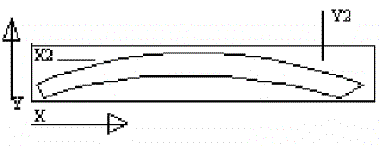|
DinghBat is an 8 foot
heavy displacement Pram dinghy designed for use as a tender or small
pleasure craft. It has a dart cut into the front of the bottom panel and
has a vee in the front, blending into a flat bottom aft. The bottom panels
can also be done in 2 pieces. The 2 water lines are at 300 and
500lbs displacement. With a boat weight in the 50lb range this leaves a
lot of carrying capacity. The boat could also be set up for sail. For
rowing, I would recommend a skeg be attached to the bottom. Using a beefy
rear transom, you could use a small motor also.

|
Bottom Panel
Half |
|
Station |
X |
Y |
X2 |
Y2 |
|
1 |
0 |
0 |
0
|
18
|
|
2 |
12 |
0 |
12
|
19 7/16 |
|
3 |
24 |
0 |
24
|
20 5/8
|
|
4 |
36 |
0 |
36
|
20 15/16 |
|
5 |
48 |
0 |
48
|
21
|
|
6 |
60 |
0 |
60
|
20 1/16 |
|
7 |
72 |
0 |
72
|
17 7/8
|
|
8 |
84 |
3/16 |
84
|
14 3/4
|
|
9 |
90 1/4 |
3/8 |
N/A |
N/A |
|
10 |
N/A |
N/A |
92 1/2
|
12 1/16 |
|
|
|
Side Panel First
Chine |
|
Station |
X |
Y |
X2 |
Y2 |
|
1 |
N/A |
N/A |
0 |
16 7/16 |
|
2 |
1 1/8
|
5 5/16 |
N/A |
N/A |
|
3 |
12
|
3 1/8
|
12
|
15 7/8
|
|
4 |
24
|
1 1/2
|
24
|
15 3/8
|
|
5 |
36
|
9/16 |
36
|
15
|
|
6 |
48
|
1/16 |
48
|
14 5/8
|
|
7 |
60
|
1/16 |
60
|
14 5/16 |
|
8 |
72
|
1
|
72
|
14 3/16 |
|
9 |
84
|
2 15/16 |
84
|
14 1/4
|
|
10 |
94
|
5 5/16 |
N/A |
N/A |
|
11 |
N/A |
N/A |
96
|
14 3/8
|
|
|
|
Rear Transom
Half |
|
|
|
Station |
X |
Y |
|
|
|
1 |
0
|
0
|
|
|
|
2 |
0
|
18
|
|
|
|
3 |
10 3/4
|
21 1/8
|
|
|
|
4 |
|
|
|
|
|
|
|
|
|
|
|
Front Transom
Half |
|
|
|
Station |
X |
Y |
|
|
|
1 |
0
|
0
|
|
|
|
2 |
3 7/16 |
11 3/8
|
|
|
|
3 |
14 1/16 |
11 7/8
|
|
|
|
4 |
|
|
|
|
All
measurements are in inches. The end points of the plotted lines are joined
by a straight line.

This shows how the measurements are used to lay
out the panels. X and Y are the bottom line of the panel and X2 and Y2 are
the top line. All points are from the edge of the ply or a baseline. Any
points which are N/A are not plotted. They may just be not on the panel or
are not important to that line. The two end points are closed with a
straight line.
For information on Stitch and Glue, please check
the construction of fisher10. The hull was done entirely with stitch and
glue, except for the transom/side panel joint, which was first attached
with screws and then filleted on the inside and taped on the outside.
There are also many good sites with Stitch and glue information.
www.bateau.com has an excellent primer on the subject, so do most of
the other major plans dealers, such as Glenn-L and Clark Craft. |